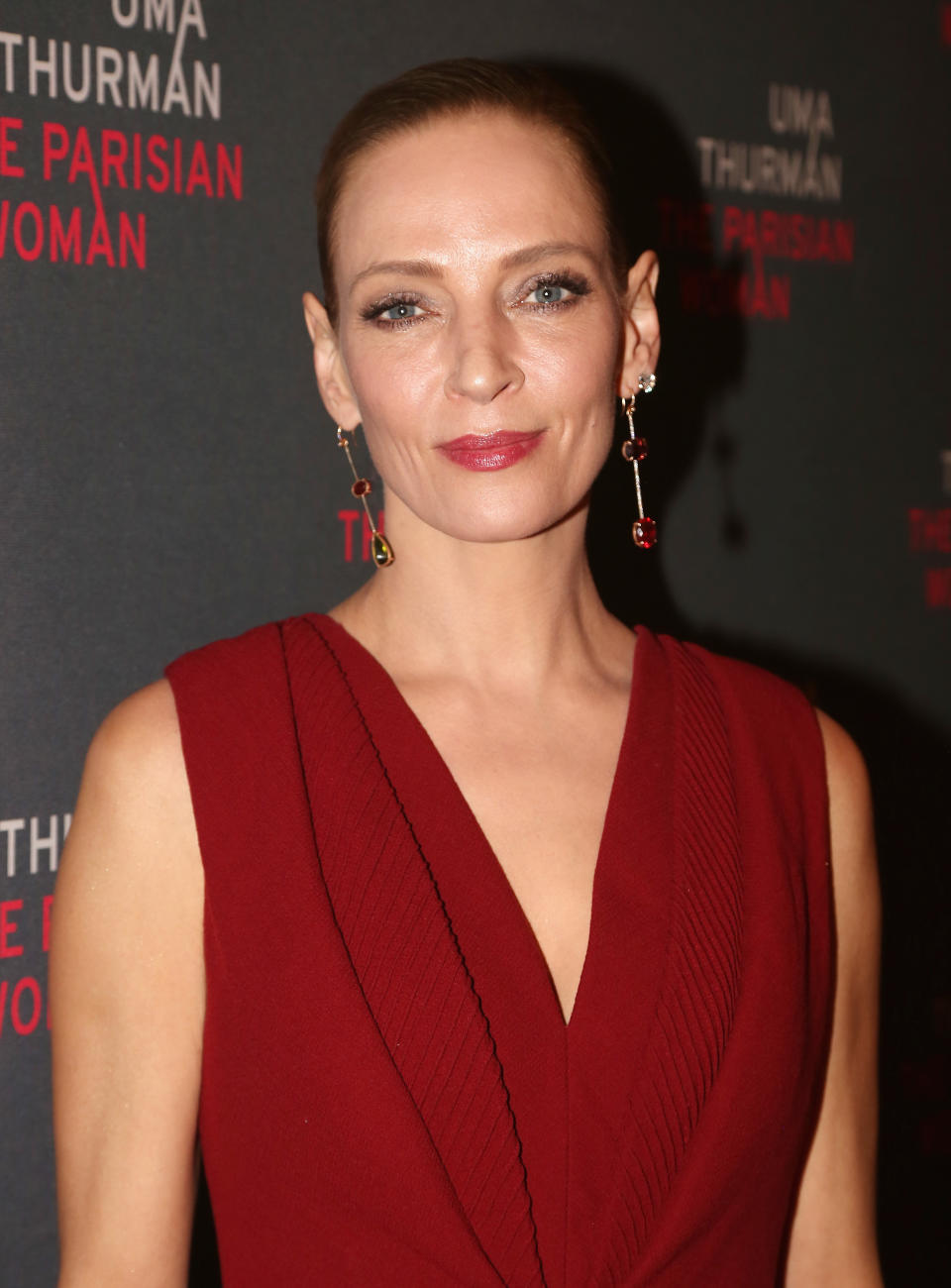Kate Upton and Uma Thurman waited years to tell their #MeToo stories. Here's why.

Kate Upton, Uma Thurman, and Salma Hayek are some of the many women who have been inspired by the #MeToo movement to tell their stories of being victims of sexual assault and harassment, and all three have acknowledged that they remained silent for many years.
On Friday, Upton appeared on Good Morning America to explain why it was only seven years later that she came forward to make the claim that Guess co-founder Paul Marciano had sexually harassed her. “What do you say to people who say, ‘Well, why now? Why didn’t you say something then when it first happened? Can you help them understand the difficulty?” GMA co-host Robyn Roberts asked the supermodel.
.@KateUpton to @RobinRoberts on her own #MeToo story: "You’re also having doubt in your mind of how I acted. Did I ask for this treatment? But you didn’t. This is their behavior." https://t.co/8QlXZD2mQJ pic.twitter.com/RVM5h3A4Me
— Good Morning America (@GMA) February 9, 2018
“Well, you know what, because it was a completely different world then, when it happened … and I was 18 years old,” answered Upton, 25. “And everybody around me is telling me to — well, they’re not telling me — but they’re pushing me to not tell my story. It’s better to keep things in the dark or just go because everyone is incentivized by me getting on set, the agents — everybody gets paid if I show up on set. So, you’re constantly pushed to show up on set no matter what happens. And they’re bringing up examples of other women who are fine with this behavior and have really successful careers, so you’re suddenly being pushed to be there.”
Upton further explained, “And you’re also having doubt in your mind of how I acted. Did I ask for this treatment? But you didn’t. This is their behavior. And I think that the women who came out before and after me really proved that Paul’s pattern is real.”
Earlier this month, Thurman told the New York Times that not disclosing her alleged assault by Harvey Weinstein in the 1990s still haunts her. “The complicated feeling I have about Harvey is how bad I feel about all the women that were attacked after I was,” Thurman told the paper. “I am one of the reasons that a young girl would walk into his room alone, the way I did … and all these lambs walked into slaughter because they were convinced nobody rises to such a position who would do something illegal to you, but they do.”
Thurman explained, “I stand as both a person who was subjected to it and a person who was then also part of the cloud cover, so that’s a superweird split to have.”

She later added, “Personally, it has taken me 47 years to stop calling people who are mean to you ‘in love’ with you. It took a long time, because I think that as little girls we are conditioned to believe that cruelty and love somehow have a connection, and that is like the sort of era that we need to evolve out of.”
In December, Hayek shared her experience with Weinstein, describing her silence toward the alleged abuse as “cowardice” and also her inability to explain why she continued to work with a man who “had hurt me so deeply.”
Hayek wrote, in the opinion section of the New York Times, “I hid from the responsibility to speak out, with the excuse that enough people were already involved in shining a light on my monster. I didn’t consider my voice important, nor did I think it would make a difference.”
She continued, “In reality, I was trying to save myself the challenge of explaining several things to my loved ones: Why, when I had casually mentioned that I had been bullied like many others by Harvey, I had excluded a couple of details. And why, for so many years, we have been cordial to a man who hurt me so deeply. I had been proud of my capacity for forgiveness, but the mere fact that I was ashamed to describe the details of what I had forgiven made me wonder if that chapter of my life had really been resolved.”
Hayek said, “When so many women came forward to describe what Harvey had done to them, I had to confront my cowardice and humbly accept that my story, as important as it was to me, was nothing but a drop in an ocean of sorrow and confusion. I felt that by now, nobody would care about my pain — maybe this was an effect of the many times I was told, especially by Harvey, that I was nobody.”

The responses from these women aren’t unusual. The U.S. Equal Employment Opportunity Commission estimates that 70 percent of workplace harassment cases go unreported, with victims instead choosing to avoid their harasser, downplay the abuse or vent to family and friends.
The driving force behind this silence is often fear of not being believed, or of social and professional retaliation — counterattacks dubbed “the second rape” by scientists who study sexual assault. It is also motivated by the fact that offenders are protected by society’s inaction. Recent research conducted by ABC News and the Washington Post found that 95 percent of women who experienced sexual harassment say their abuser didn’t face any consequences.
This often leaves victims to carry the emotional weight of the crime, and sometimes to blame themselves, as Thurman suggests.
“It’s possible that female victims assume blame because women are socialized to be empathetic and maternal,” Debra Borys, PhD, a Los Angeles-based psychologist who specializes in sexual harassment and abuse, tells Yahoo Lifestyle. “They may feel guilty about not speaking up, believing that the perpetrator would have been otherwise stopped, but that’s not necessarily true — often times these people don’t stop, they just abuse in a different context.”
The guilt forced on a victim either by the perpetrator or, in Upton’s case, by the people who pushed her to “keep things in the dark,” can be crushing. As Upton said, people’s paychecks depended on her willingness to stay silent.
Ultimately, says Borys, speaking up is a solid step in moving past sexual harassment and abuse.
Read more from Yahoo Lifestyle:
‘Maybe the men are scared to be beaten by the girls’: Olympian Erin Hamlin on sexism in sports
People are calling the judge who sent Larry Nassar to prison a hero
Follow us on Instagram, Facebook, and Twitter for nonstop inspiration delivered fresh to your feed, every day.
